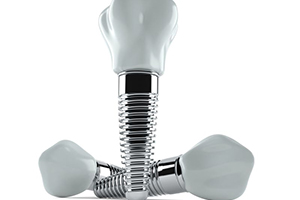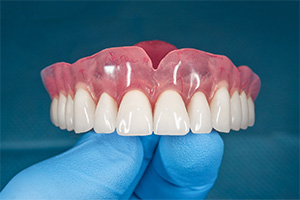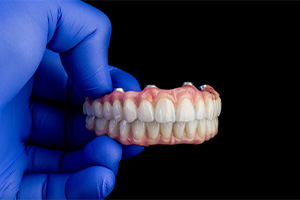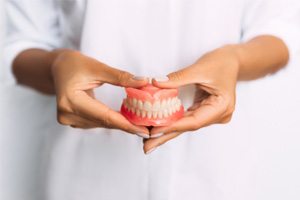
Dentures – East Hartford, CT
Cost-Effective and Reliable Tooth Replacement

Tooth loss is a problem that afflicts millions of people across the nation and across the world. Fortunately, modern dentistry offers numerous solutions to replace lost dentition, increase chewing power, and help patients regain confidence in their smile. Dentures are one of those solutions. If you are interested in learning more about this restorative service and finding out if it is a fit for you, get in touch with Comprehensive Dental Associates of Central Connecticut to schedule a consultation.
WHY CHOOSE COMPREHENSIVE DENTAL ASSOCIATES OF CENTRAL CONNECTICUT FOR DENTURES?
- Skilled, compassionate restorative team
- Traditional and implant-supported prosthetics available
- Efficient, personalized care
Who Is a Good Candidate for Dentures?

Dentures are a valid treatment option for almost anyone who has lost multiple teeth. During your consultation, we will confirm that they are a suitable choice for you. Even if your oral health is not currently able to support dentures, you may become a candidate for them after some preliminary treatment. Our team will do all we can to enable you to enjoy reliable, sturdy, and functional tooth replacement!
Effects of Missing Teeth

Tooth loss can be the result of gum disease, injury, genetic factors, past mistakes, or a number of other factors. Regardless of what caused your condition, the current state of your mouth might interfere with your daily life and health in a number of ways:
- You may feel self-conscious about your appearance. As a result, you might be reluctant to engage with others in social situations.
- It can be difficult to eat a nutritious diet. Without a full set of teeth, you might gravitate toward soft foods and miss out on the nutrients in things like fresh fruits and veggies.
- Your cheeks may appear hollow. This can age your face.
Fortunately, dentures can help to address all such issues.
What Qualifies You for Dentures?

You may benefit from dentures if:
- You have lost all or most of your teeth throughout one of your dental arches.
- You still have many of your natural teeth, but they are loose or in constant pain.
- Your gums are swollen and red due to the discomfort of eating without teeth.
- You have an old denture that no longer fits well.
- You are looking for a cost-effective way to replace your teeth.
During your consultation, we can confirm your candidacy for dentures and start mapping out the details of your treatment plan.
Alternative Tooth Replacement Options

If dentures are not right for you, you might choose to move forward with an alternative form of tooth replacement, such as:
- A fixed bridge. This type of prosthetic can replace one or more teeth. It consists of two crowns that support prosthetic teeth between them. A fixed bridge can last for a decade or longer and is very sturdy.
- Dental implants. Implants act as prosthetic tooth roots. They can support crowns, bridges, and dentures. Due to the many benefits they offer, such as outstanding stability and longevity, they are commonly regarded as the gold standard of tooth replacement.
What Are Dentures?

There are a few different types of dentures:
- Full dentures consist of a complete arch of prosthetic teeth attached to a gum-colored base. Natural suction or a mild adhesive helps them to stay in place. They are usually made out of acrylic or porcelain.
- Partial dentures replace multiple missing teeth at various places throughout a dental arch. They fit in around the remaining natural dentition and stay in place with the help of small clasps.
- Implant-supported dentures are anchored in the jawbone via prosthetic tooth roots, called dental implants. They are the strongest and longest-lasting type of denture.
How Dentures Are Made

The process of getting dentures varies from patient to patient, depending on their oral health and the type of denture they will receive. However, the treatment always involves taking images and impressions of the mouth to ensure that the prosthetic teeth fit well. Our dentists also pay careful attention to aesthetics so that the look of your new teeth will complement your natural facial characteristics.
Would you like to learn more about how dentures are made? Below, you will find some relevant information.
What Are Dentures Made Of?

Dentures consist of two main parts:
- The base of dentures is usually made of gum-colored acrylic, which tends to sit comfortably against the gums. In some cases, nylon or resin is used instead of acrylic. Partial dentures typically have acrylic or metal attachments on the base to help them stay secure in the mouth.
- The teeth of dentures are usually constructed of either acrylic or porcelain. Acrylic is often the material of choice for patients who still have some of their natural teeth, whereas porcelain is more popular among patients who need full-mouth tooth replacement.
The Denture Creation Process

The denture creation process can vary a bit from patient to patient, but it usually goes something like this:
- Our team will take impressions of your mouth using a putty-like material and impression trays. Once we capture an accurate representation of your teeth, a plaster cast can be created that will serve as the basis for designing your dentures.
- A dental lab will work with the cast to create a wax version of your gumline. A machine called an articulator will place artificial teeth into the wax. The wax-up will be used as the basis for creating your dentures.
- The wax-up will be sent to our office, and you will visit us for a fitting. We will continue to coordinate with the lab until your final prosthetic is ready.
- Once your dentures are made, you will come in for a final fitting so we can make sure that your new teeth fit well and look good. Then, you can go off and begin the process of adjusting to your restored smile.
Adjusting to Your New Dentures

Adjusting to new dentures can take a few weeks or months. At first, your prosthetic might make your gums feel sore, and you might experience a slight lisp when you speak. You could also produce more saliva than usual. Such issues usually go away with time and practice. Try to use your denture as much as possible. However, it if ever causes you significant pain, or you believe it does not fit quite right, give us a call. We may be able to make some adjustments to it.
Benefits of Dentures

Missing teeth can have devastating consequences on various aspects of your life. Fortunately, dentures can mitigate the effects of an incomplete smile by allowing you to eat a wide variety of foods, smile with confidence, and speak clearly. Indeed, they can be a powerful force for good that elevates your overall quality of life. What are some specific benefits of dentures that you can look forward to? Here are a few examples:
Psychological Benefits

Edentulous individuals (people who are missing all of their teeth) often suffer mentally and emotionally due to their condition. They may have a tendency to isolate themselves, avoiding social situations that would help them to enjoy the benefits of meaningful relationships with others. They may also feel a deep sense of loss due to their missing teeth.
Dentures have the potential to address such issues. They can allow you to focus less on what your smile looks like and more on enjoying all of the wonderful things that life has to offer.
Clearer Enunciation

Clear speech depends on complex interactions between various structures, including the teeth. Without teeth, you may find it difficult to clearly enunciate certain sounds. You might even shy away from conversation as a result.
Dentures replace missing teeth and can help you to regain the ability to speak with clarity and confidence. After a short adjustment period, they might even feel like a natural part of your mouth! (Dentures might give you a slight lisp at first, but that usually disappears with a bit of practice.)
Improved Nutrition

Without teeth, you may have to stick to a soft or liquid diet. As a result, you might not get all of the nutrients that your body needs to function optimally. Dentures can help you to chew a wide variety of foods, including fruits, vegetables, and other nutrient-rich options. You may have to make some slight adjustments to how you eat such foods, particularly if they are tough, crunchy, or chewy, but for the most part, you should find it easy to eat the things you enjoy and that make you feel good from head to toe.
Preservation of Oral Health

If you still have some of your natural teeth, dentures can help to preserve them. Your prosthetic can act as a sort of placeholder that prevents your natural dentition from drifting out of place. You can thereby maintain a comfortable, functional bite. Also, because dentures allow you to distribute food evenly across your mouth, they can reduce the stress on your remaining teeth so they experience less wear and tear.
Expanded Opportunity

Your smile — and your teeth — are among the first things that people notice about you. Whether you are attending a job interview, selling products or services to clients, or applying for a promotion, making a great first impression is important. Sadly, missing teeth and other oral health problems might give others the wrong idea about you. Usually, people with a complete, healthy smile are perceived as being successful, approachable, and likeable. Dentures might just give you a leg up in your career!
Understanding the Cost of Dentures

As mentioned above, traditional dentures are one of the most cost-effective ways to replace teeth. The price of your prosthetic will depend on whether you are getting a full or partial denture, the materials used to make the denture, and the extent of any necessary preparatory work (such as extractions). Most insurance plans cover about half the cost of dentures, up to the policy’s annual maximum. Low-interest financing is also available for most patients.
Factors that Affect the Cost of Dentures

Three major factors that influence the cost of dentures in East Hartford include:
- Preparatory procedures. You might need extractions, gum disease therapy, or other treatments before getting your dentures.
- The base of dentures is usually made of acrylic, while the teeth may be either porcelain or acrylic. The quality of these materials, as well as the companies that provide them, can influence overall costs.
- The type of denture. Full, partial, and implant dentures all have different price points.
Be extremely wary of any cheap or “bargain” dentures. Remember, quality is important, and you are likely to get what you pay for.
Are Implant Dentures More Expensive?

Yes, implant dentures in East Hartford cost more than their traditional counterparts. The difference in price stems from the fact that the implant denture procedure is more complex and more time-consuming. It also requires more materials and a higher level of skill on the part of your dental team.
Despite their higher cost, most patients would agree that implant dentures are worth the price. They are an excellent value because they last much longer than traditional dentures, which usually need to be replaced every 5 – 7 years. Plus, implant dentures offer some truly priceless benefits, such as preservation of the jawbone tissue.
Does Dental Insurance Cover Dentures?

In most cases, yes. Dental insurance usually categorizes dentures as a major procedure, which means that around 50% of their cost may be covered, up to the amount of a policy’s annual maximum. Many patients are able to save hundred of dollars or more on their treatment by using their insurance. Our team will be happy to help you file claims and answer your questions about how your plan applies to your treatment.
Other Options for Making Dentures Affordable

As your denture dentist in East Hartford, we want to do everything we can to help you afford your treatment. To that end, we offer a few provisions:
- Most patients qualify for third-party financing through CareCredit. The application process is fast, and you may be able to choose from between several different monthly payment amounts.
- Essential Dental plan. This discount plan provides reduced fees on most of the services we offer.
- Free dental implant consultation. If you are interested in implant dentures, you can start your journey for nothing out of pocket.
Are you ready to rebuild your smile with dentures? Get in touch with our team today to schedule your consultation. We look forward to helping you navigate every aspect of your treatment, including its financial side.
Dentures Aftercare

Your dentures can serve you well for several years, but in order for them to reach their potential, it is important that you take care of them! One key step you can take is to make sure that you attend regular checkups with our team. We will monitor your gum health, help maintain your prosthetic, and give you personalized advice that will allow you to get the most out of your dentures. If we notice any problems, we may be able to address them promptly, before they become serious.
What else can you do to take good care of your dentures? Continue reading below to discover some practical guidance.
Removable Dentures
Remove After Eating

It is a smart practice to remove your dentures after each meal and rinse them off. This can prevent food particles and plaque from building up on them, and it can allow you to keep your oral tissues clean as well. Be sure to use cool or lukewarm water when you are rinsing your prosthetic; hot water might cause them to warp and lose their shape.
Clean Your Restoration

In addition to regularly rinsing your dentures, it is important to have a thorough nightly cleaning routine. Remove them from your mouth and use a soft-bristled brush, along with a mild cleaning agent, to clean all their surfaces. Do not use regular toothpaste, since it might cause scratches. After brushing your dentures, soak them in water or a cleansing solution so they stay moist and do not lose their shape. Rinse them thoroughly before placing them back in your mouth.
Keep Your Dentures Safe

To lower the risk of damage to your dentures, you should:
- Give them a soft landing. When you remove your dentures, do so over a folded towel or a sink full of water. This will give them a soft place to land if you accidentally drop them.
- Store them in a safe place. Pets and small children tend to be curious about dentures and might even take off with them. Store them in a place where they are out of reach.
Remove When You Sleep

It is important that you remove your dentures at bedtime each night. Doing so allows your gums a chance to breathe, which can encourage good circulation. It is also important for oral hygiene; soaking your denture overnight in a cleansing solution can help to get rid of lingering bacteria that might otherwise cause odors. (If you wish to keep your dentures in your mouth 24/7, ask our team about tooth replacement options that can be fixed in your mouth for around-the-clock wear.)
Notice Changes

You should keep a close eye on both your oral tissues and your dentures. If you notice any changes, such as gum irritation, signs of infection, mouth sores, or changes to the way your prosthetic fits, schedule an appointment with us. Your dentures might need to be relined (adjusted), or they may require other types of maintenance.
Denture FAQs

If you are ready to begin your treatment process for dentures in East Hartford, our team is eager to assist you. Still, we understand that you may want more information before you commit to anything. To help you out, we have put together the following list of FAQs about this procedure. If you would like further explanation on anything you discover here, please give us a call so we can personally speak with you.
How Long Will You Have to Wait to Get Dentures After Your Teeth Are Pulled?
In most cases, patients must for wait 6 – 8 weeks after tooth extractions to get dentures. The waiting period allows the gums to heal. However, there are some exceptions. For example, some patients choose to get immediate dentures, which are usable immediately after extractions. They require more adjustments than conventional prosthetics, but many patients believe it is worth it to get a new smile so quickly.
On the other hand, if you get implant dentures, it may be several months between your extractions and your denture placement. The waiting period allows your new prosthetic tooth roots to form a strong bond with your jawbone.
Can I Sleep with My Dentures?
When you first get your new teeth, your denture dentist in East Hartford may tell you to wear them continuously for the first 24 hours. Thereafter, you should remove your prosthetic each night. Removing it allows your gums to rest. It also gives you the opportunity to thoroughly clean your dentures and your mouth. Your diligent oral hygiene routine can prevent your new teeth from accumulating odors and stains. It can also protect your mouth from sores and infections.
Will It Hurt to Get Dentures?
If you need to undergo extractions before getting dentures, you can expect to experience some soreness after your teeth are pulled. Later, when you first get your new teeth, it may take some time for you to adjust to them. They might cause some gum soreness. This issue can last anywhere from a few weeks to several months. Implant dentures are generally must easier to adjust to than their conventional counterparts.
Is It Hard to Talk with Dentures?
Clear speech is the result of complex interactions between the tongue and teeth. Ultimately, therefore, your dentures should improve your speech. However, you will first have to adapt to speaking with them. In the meantime, you may have a lisp. Try to practice speaking as much as possible as you are trying to get through the adjustment period. Reading out loud is also helpful.
If you have already had your dentures for a while and you begin to experience speech difficulties, it could be because your prosthetic no longer fits well. Your dentist may be able to adjust them.